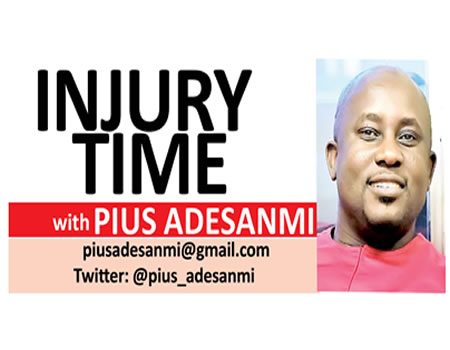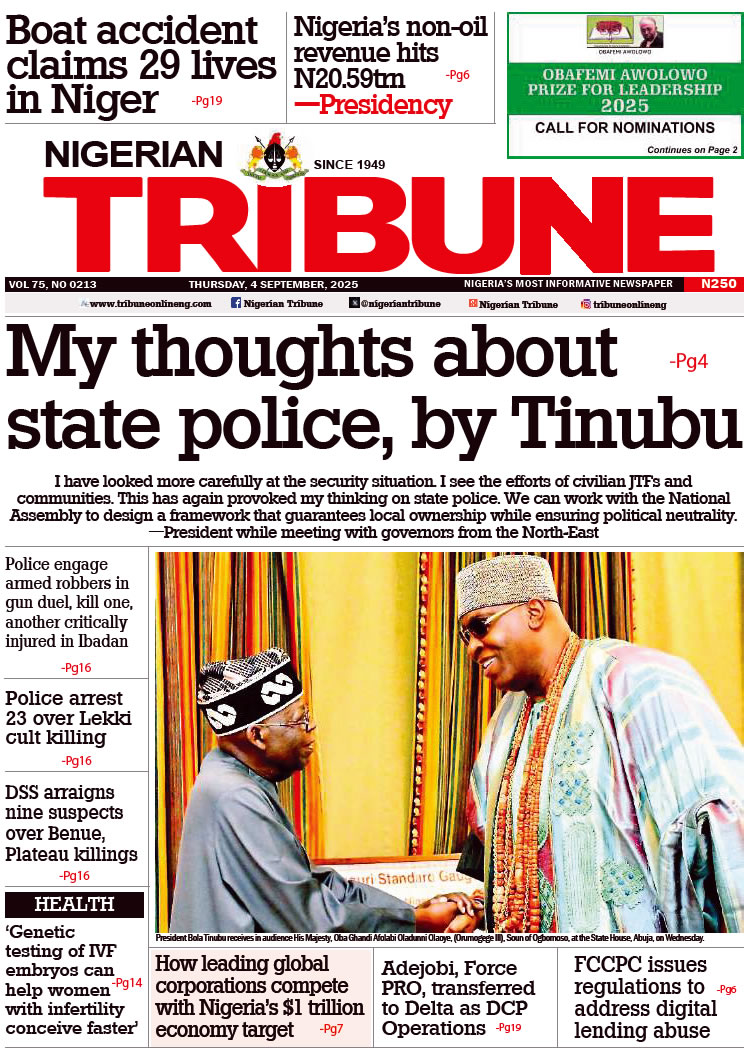We bring you the continuation of the late Professor Pius Adesanmi’s keynote address he delivered at the 2014 Obafemi Awolowo Memorial Symposium held in Lagos.
THIS poem gives us the title of today’s proceedings. It is also the unsung and always unreferenced origin of the use of that phrase – the road not taken – in much of our national discourse. Perhaps, the deciders of the theme of this symposium weren’t even aware of the fact that they were drawing a straight line all the way back to this poem. However, for our purposes today, what I want you to pay attention to is the overwhelming evidence of individuality in this poem. There is only one isolated subject speaking of individual choice, destiny, and consequences in this business of taking or not taking a particular road. Notice that this wayfaring Western persona in the poem describes himself as “one traveler” and treats us to a generous deployment of “I” in three of the four stanzas of the poem.
If only the speaking subject in Frost’s poem had been an African of Chief Obafemi Awolowo’s ethnic stock! He would have been faced with an entirely different, and I dare say, more auspicious proposition. For one, he would not have been alone, for in this business of forked or bifurcated roads, the Yoruba world view allows for the presupposition of the presence and guidance of either those who have gone before and have therefore acquired the requisite experience to guide he or those who “follow behind”, to borrow a popular Naija-speak; or the presence of those who, even if still here among us, possess such superior intellect and vision as could be deployed for the collective benefit of a people at the critical moment of choice – the choice of roads and paths.
In essence, to the aloneness, singularity, and individuality of Frost’s confused fictional character who stands at that critical bifurcation, saying, “me, myself, and I” must decide which of the two diverging roads to take, the Yoruba world responds with a co-presence which banishes aloneness, a voice of wisdom, prescience, vision, and experience; a superior intellect saying to the lonely traveler: “You are not alone. Igbo re, ona re”. This voice, we must insist, is not an intrusion into the private recesses of individual agency at the moment of choice. Rather, it is evidence of a communalist telos designed to deny the validity of lazy alibis and excuses in the event of sad and stubborn wrong choices and decisions. For the remainder of this lecture, whenever I scream “Igbo re”, your chorus shall be “Ona re”. For none Yoruba speakers, “igbo” is bush, signifying here the wrong way, full of thorns, serpents, and wild animals. “Ona” is way, road or path, signifying here the right way. When a Yoruba elder tells you “igbo re, ona re”, he is saying “here is the bush and here is the road, the choice of which to take is yours”!
Make the appropriate substitutions and that singularly forlorn persona in Frost’s poem, standing splendidly alone at the point of divergence of two roads becomes Nigeria at the parturition point of project nationhood in the first half of the 20th century. But Nigeria was never going to be alone in that long march to the choice of a road to national destiny. The she-goat was never going to be left alone to suffer the pains of parturition. Project Nationhood, that new space of civic and psychic belonging that was going to be forged out of the inchoate desires of different ethnic nationalities yoked together by colonialism, was singularly blessed by the presence of a stellar cast of nationalist heroes and sheroes, of statesmen and women, some destined for demiurgic roles, some destined for vatic roles, some destined to combine both and even more roles as they screamed at that emergent nation at the crossroads: igbo re, ona re!
It is my contention that as far as the constitutional history and trajectory of Nigeria is concerned, Chief Obafemi Awolowo was at once demiurgic (creator, originator) and vatic (visionary) and that, for me, is what makes his own voice the loudest in the assembly of founding fathers who tried to tell Nigeria: igbo re, ona re! But let us pause to probe this “igbo re, ona re” business further before we begin to unpack how Chief Obafemi Awolowo specifically applied it scrupulously to Nigeria’s process of constitutionally becoming and what we may learn from his proposals as we march yet again Abuja for a national dialogue.
The privilege of not being alone at the crossroads, the privilege of enjoying the guidance and co-presence of that cautionary voice of wisdom, does not in any way conduce to intellectual laziness and ethical demission at the moment of choice. The role of that voice is purely advisory. The exercise of choice is still your responsibility. In essence, nothing in the Yoruba world compels that patriarch, that matriarch, that visionary voice which stands beside you at the fork in the road to do more than point out which is the road and which is the deceptive option which hides thorns and thistles, potholes and gullies after the very first sharp bend.
In essence, if Chief Obafemi Awolowo had done nothing more than stand with Nigeria at that critical fork in the road to constitution-making in the 20th century; if he had done nothing more than show her the choices and possibilities, saying, “Nigeria, igbo re, ona re,” before turning his back to return to the warm embrace of his wife and children in Ikenne; if he had done nothing more than this, he would still have more than largely satisfied the imperatives of his culture. He would have done his bit. He would have done his best. Nothing in that culture compels him to tarry perpetually, to linger permanently in the company of a wilfully blind and voluntarily deaf customer like Nigeria, hanging on to the feet of this customer, and trying to place them on the right road.
In other words, as far as the philosophy of “igbo re ona re” is concerned, any gesture, any action beyond the utterance of that caution is an extraordinary privilege enjoyed by the person or entity being advised. It is jara, it is supplementary. No sage is compelled to go that far. Ladies and gentlemen, that is precisely why Chief Obafemi Awolowo stands out in terms of his decades-long commitment to Nigeria’s constitutional development in particular and to the overall envisioning of the country’s destiny in general.
Decade after decade after decade; in book after book after book; in essay after essay after essay; in speech after speech after speech; in action after action after action, what we confront in Chief Awolowo’s extraordinary output, especially with regard to constitution-making, is precisely that extra mile, that extra gesture, that jara after the solemn and repeated utterance of “igbo re, ona re”. I would therefore want us to consider his expansive body of work, an intellectual tour de force, as fulfilling the dual function of showing Nigeria the difference between the right way and the wrong way to constitutional bliss and also going the extra length of painstakingly mapping out strategies for travelling on the right way.
The theme of this symposium, we must remind ourselves, insists that there is an Awo road to the Nigerian constitution that was not taken. The temptation is great to begin any analysis of the nature, character, and prescriptions of that road and why we refused to do any mileage on it by focusing on the statesman’s 1966 book, ‘Thoughts on Nigerian Constitution’, because its title bears the most direct resonance, not just to our objectives today, but also, and perhaps more importantly, to Nigeria’s ongoing quest for constitutional direction at fifty-three. Doing this would be starting the story in medias res for the said book is but a significant culmination of a long maturational process of intellectual rigour and prescience with regard to the articulation of a constitutional path for Nigeria.
A clear hint of the incipience and long evolution of Chief Awolowo’s thought on Nigerian constitutional issues can be found in ‘Awo’, his 1960 autobiography. Chapter twelve of the autobiography is entitled “Evolution of a federalist”. Here, the thinker declares: “In 1951 when the controversy on the form of Nigeria’s constitution began, I had already been for more than eighteen years a convinced federalist.” The path to this conviction, Chief Awolowo informs us, started as early as 1928 when he encountered the thought and work of Indian nationalists and the Indian National Congress.
TO BE CONTINUED
WATCH TOP VIDEOS FROM NIGERIAN TRIBUNE TV
- Let’s Talk About SELF-AWARENESS
- Is Your Confidence Mistaken for Pride? Let’s talk about it
- Is Etiquette About Perfection…Or Just Not Being Rude?
- Top Psychologist Reveal 3 Signs You’re Struggling With Imposter Syndrome
- Do You Pick Up Work-Related Calls at Midnight or Never? Let’s Talk About Boundaries







